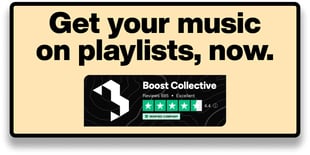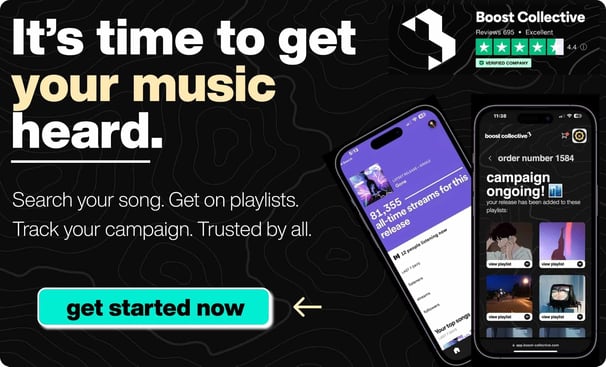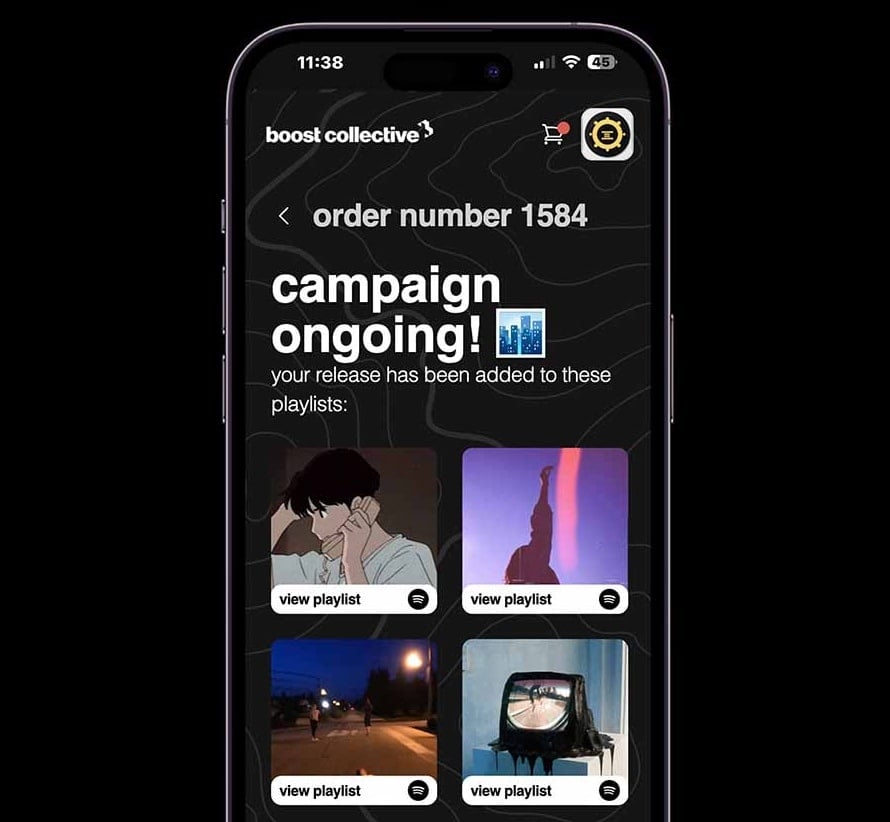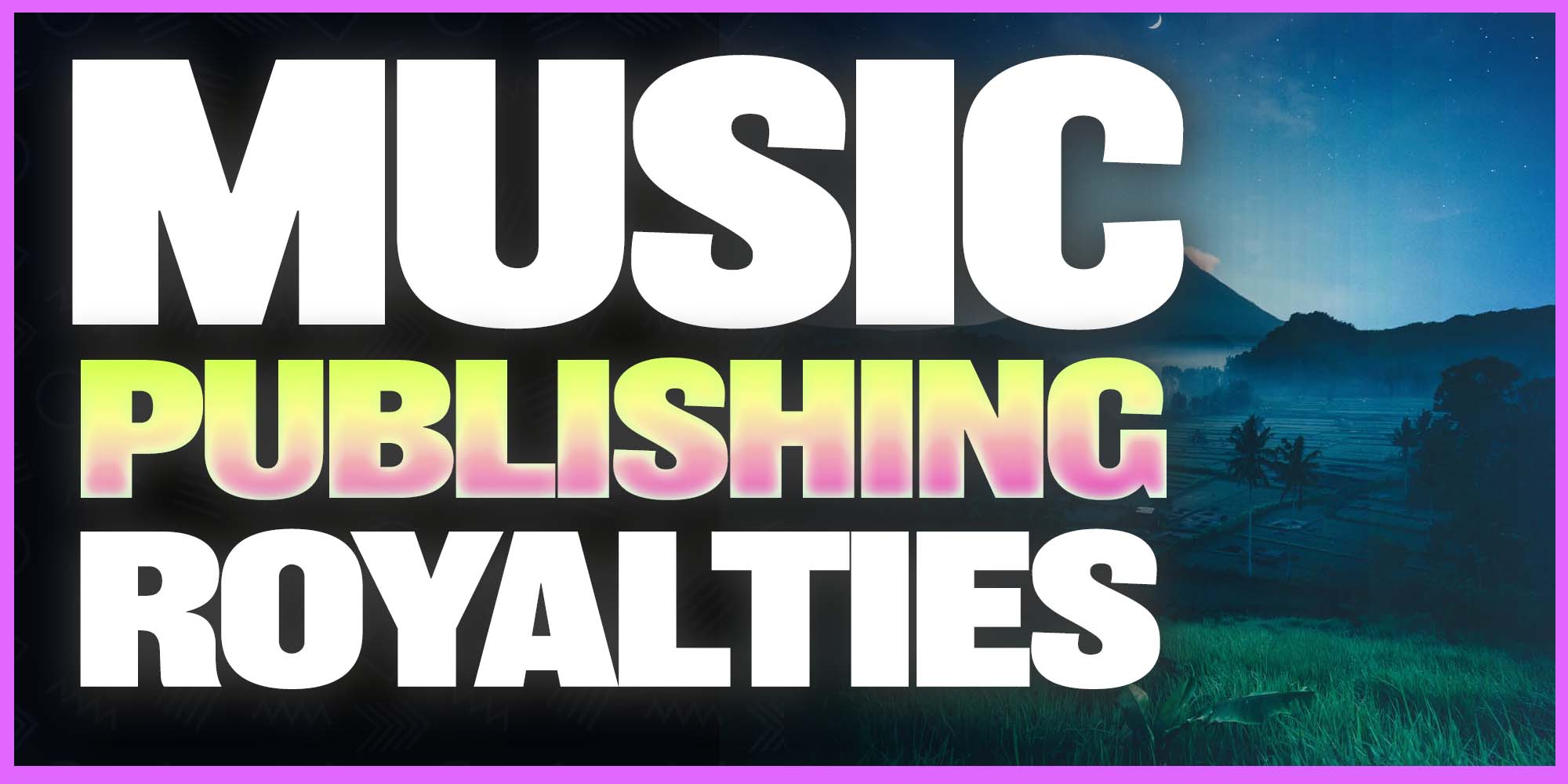
A guide To music publishing
So... What exactly are publishing royalties?
Matter of fact lots of music royalties don't make sense.
In this blog, I'm going to break down:
-
Performance royalties
-
Publishing administration
-
Different types of royalties
Want to get your music on active & relevant playlists that actually get results?
Get your music heard now 👇
Have a sound recording and want to collect ALL music royalties? Read below.
The music industry is a fast-growing and fast-changing world.
Physical music sales are 10% of what they were at their peak...
But publishing is the only part of the music industry that has stayed the same!
Before we can learn about publishing music, we need to know about the rights to music.
Copyright in music is when publishers pay the people who wrote the music to use it.
There are two copyrights for the whole record.
Along with Free Music Distribution you'll need publishing.
There are copyrights specifically for your sound recording, & writing music.
When musicians say they own their Master Records, they mean they have the rights to the original sound files!
In this blog, we're going to talk about the written music (composition copyright).
The 4 types of publishing royalties: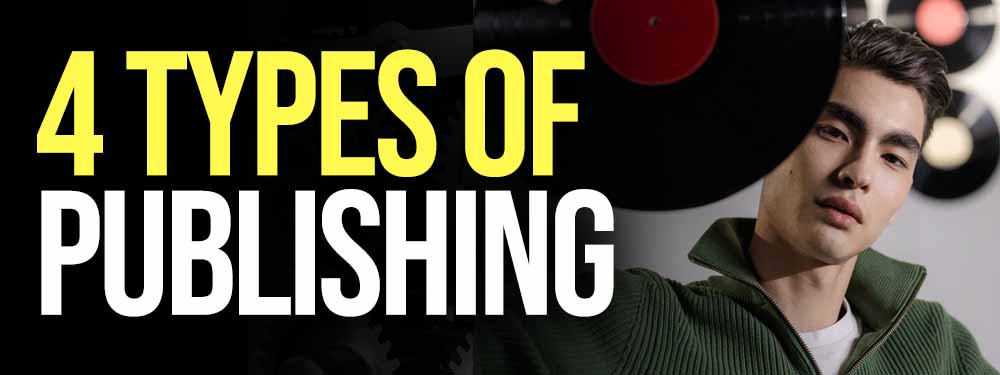
Music publishing is huge in the music business, and involves promoting and making money off of music compositions.
A music publisher makes sure that composers get paid royalties for their work and tries to find ways for those compositions to be made and copied.
The 4 primary kids of music publishing:
-
Publishing royalties
-
Master royalties
-
Print royalties
-
Synchronization royalties
Publishers are one of the oldest types of music business.
Before the first sound recording medium came out in the 19th century, sheet music publishing was pretty much in charge of the music business.
Every music publisher and record labels collective music royalties from these avenues.
Publishers usually wrote down compositions, turned them into songs, put them in stores, and paid authors for commercial uses.
How Much Money Do Producers Make Per Beat?
#1. Composition royalties
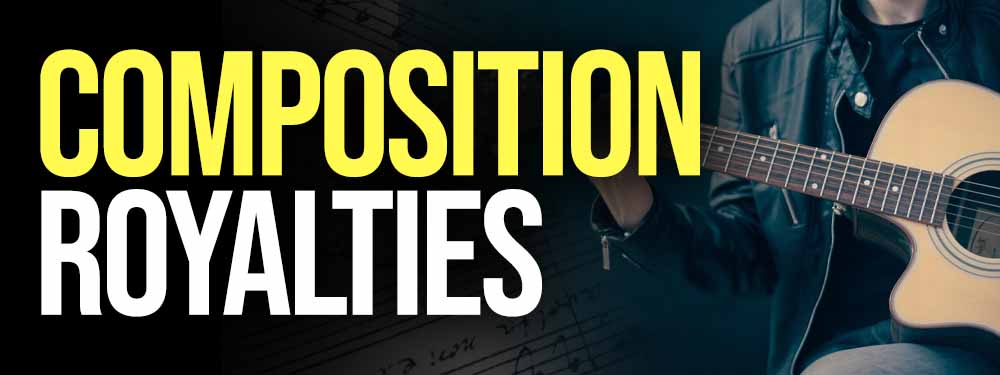
Composition copyright is earned when an original, one-of-a-kind musical work is put on a physical medium, like a notepad, sheet music, or even just a single tweet. This protects your intellectual property, which is your music.
Here is as basic idea of composition copyright:
Drake adds to the composition if he writes the melody for how a set of lyrics are sung.
If he puts the tune on a record, he is now a performing artist.
The benefits of composition royalties:
-
Allow song remixes
-
Allow song covers
This is another type of intellectual property that is important to the label business.
Masters are the final product that you hear on Apple Music or Spotify.
Even if the big labels don't own the publishing rights, they almost always own the master sound recording rights.
The value of music composition
As a music publisher, music composition is important.
If somebody decides make a remix to your song, as an independent artist you need to collect your half of music royalties, no?
That's the benefit of this type of sound recording copyright.
Music users can find mutual benefit in this type of publishing deal.
Every mechanical rights organization wants to make sure the right streaming revenue can be allocated!
Music Distribution For Record Labels!
#2. Master recording rights
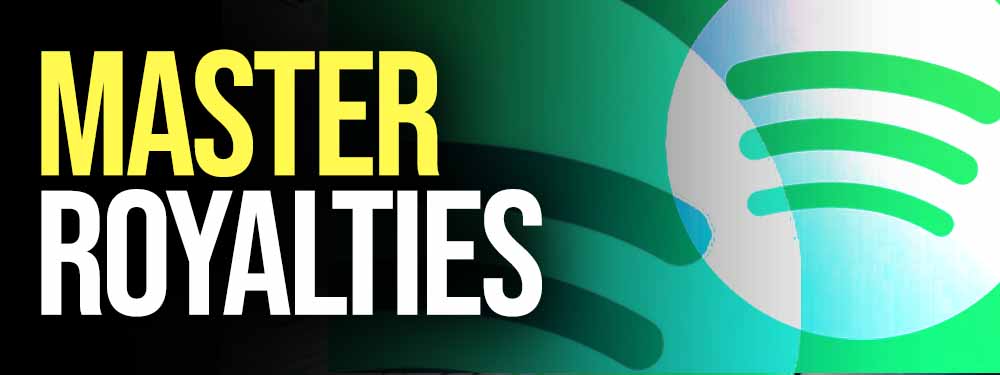
"Master rights" derives from "master record", i.e. a master record with the original sound recording.
In order to publish a song you need master rights, which you own if you have produced and recorded a song.
Master copyright owners can put their music onto streaming platforms then collect mechanical and performance royalties.
The publisher can also offer co-writing opportunities based on connections in the business.
The typical draw is thought of as an advance on the writer's share of royalties that the publisher has agreed to pay.
Some draws are enough for the writer to be able to write full time, but most are at least enough to only need a part-time job.
How Can I Make Money On Spotify?
#3. Print music publishing
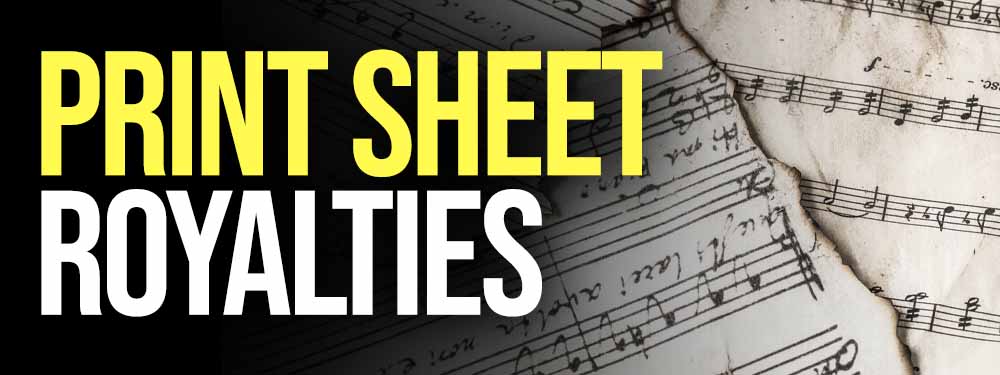
Print royalties are last, but surely not least!
Let's be real... Print music publishers are nearly extinct.
It's the least common publishing royalties generated.
Royalties from selling sheet music are called "print music royalties." This royalty is for copy-protected music that is put on paper, like a sheet of music, and then sold.
Most of the time, both the songwriters and the publishers get these royalties.
Copyright owners in this avenue get paid mainly for instrumental work.
Pianists, orchestral, and recording artists need this music copyright more than ever.
The person who owns the copyright also has to pay these fees based on how many copies of the printed piece were made.
The 30 Best Distrokid Alternatives!
#4. Synchronization royalties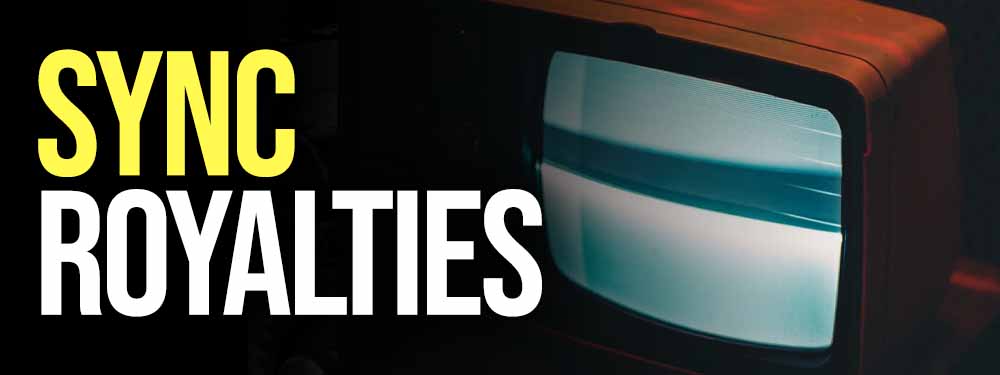
Sync licensing is when songs are used in other media, like TV shows, movies, or commercials.
You'll need to have a sync license to use copyrighted music!
Copyrighted music can't be used in a new audiovisual project without a master use license.
It comes from putting music to moving pictures at the same time.
Sync royalties that come from multiple songwriters still pay more than you'd think.
Just note: getting your music on a TV Show is not that easy.
You'll need to ship your own songs to many people and contact many agencies.
Some of the music that was made on this site could be used on other platforms.
There are many ways to get it!
This is a good revenue stream for all digital formats.
Sync licensing fees can pay a lot, and there best part is that you don't need many fans to profit as an independent artist.
Bonus - Performance royalties
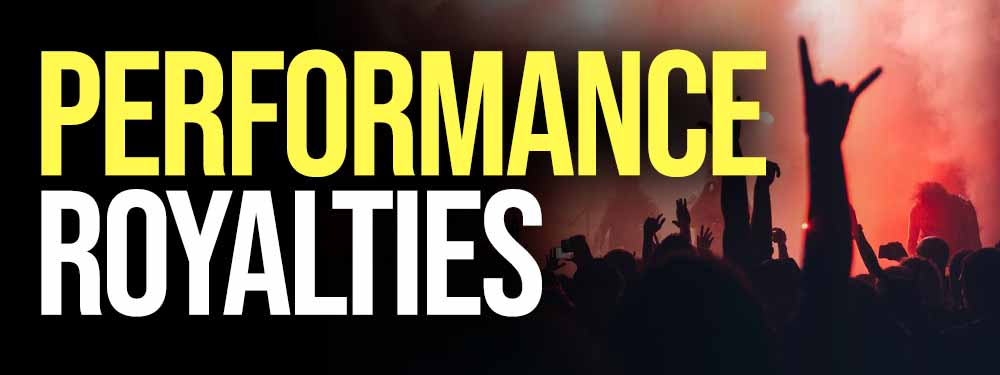
Performance royalties are money that can be made when a piece of music is played or performed in public.
Note that when you stream music from a digital streaming service, demand, you get paid both a performance royalty and a mechanical royalty!
Songwriters or publishers, who wrote or own the songs, get money from performances.
If you can contact a sync agent music supervisor, you'll see sync royalties start pouring in!
We pay our members royalties when their music is played live.
This includes tours, gigs, DJ sets, concerts, and even busking.
This revenue stream is popular if you make club/party music, since DJ's need to pay the right licensing fees.
Buskers need to fill out a form after each performance to get a royalty payment!
Performing artists deserve all their international royalties.
publishing vs music distribution
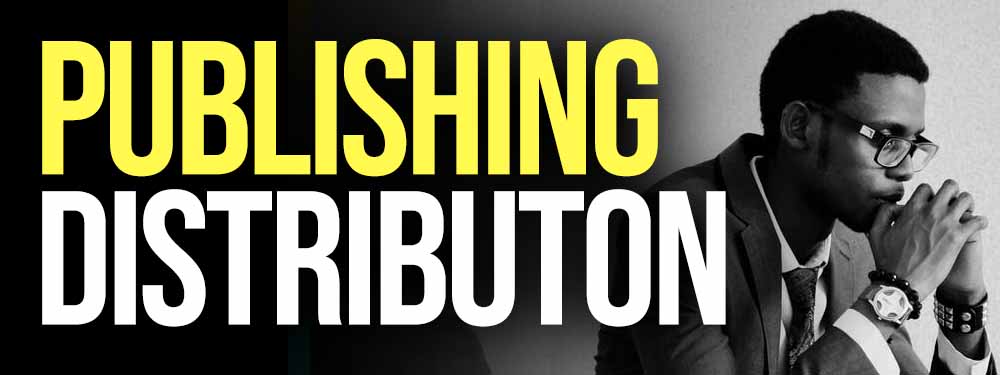
Every artist needs some way to get their music out there, whether it's through their label or a separate service.
Music publishers won't get your music onto streaming platforms, that's the role of a digital music distributor. Publishers help with the other 50% of music copyrights.
Streaming is becoming the main way people listen to music, so it makes sense to have as many ways to make money as possible!
Music royalties generated are growing every year.
Whether it's satellite and internet radio broadcast, or a music streaming service - lots of money.
The level of service you can get from these companies is much better if you use distributors that also work with independent artists.
Check out my music publishing vs digital distribution guide.
What are mechanical royalties?
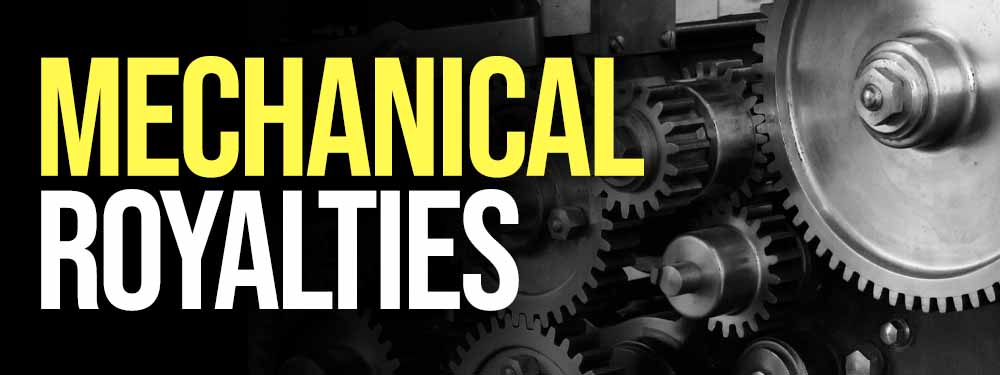
With the U.S. Copyright Act of 1909, songwriters and publishers are now owed a "mechanical" royalty.
Today, streaming and digital downloads are two new ways to get mechanical royalties.
The government sets royalty rates by changing the U.S. Copyright Act in different ways.
Mechanical royalties are pretty much where record labels make most of their money.
Why is it called "mechanical" royalties?
There was a time when songs were copied on piano rolls and vinyl records called the "mechanical" era. This is where the term originated.
Using the term in the digital age can be confusing, but the same "reproduction" standard still applies!
When an artist or record company releases a song through their own unique performance and sound recording...
They must get a mechanical license and pay the music publisher and songwriter a royalty.
Musical compositions and all the royalties surrounding it must be paid out!
The complications of music publishing
Copyright law governs how publishing royalties are calculated, which shows how hard it can seem to control the publishing business.
The business has to rely on local legislative systems that aren't connected.
This means that millions of cases overlap and can be confusing and hard to find!
Today, we're focusing on the American publishing industry, as if that wasn't already clear from other places.
Copyrights can be earned by sending a recording from the U.S. to another country and getting paid for it.
Even though the rates of royalties and the way you collect them may be different in your area, publishers all over the world have the same main jobs.
You might think that labels collect two types of royalties for these two copyrights, but they actually just take master royalties!
So what happens with the rest of the royalties? Let's break it down!
Signing up for a PRO
A PRO is an organization that collects royalties on behalf of the rights owner to make sure that songwriters and publishers are paid for the use of their music.
A collection society collects digital public performance royalties when songs are streamed digitally on Pandora, SiriusXM, or a cable music channel.
The two key roles in a performance rights organization:
-
Writer
-
Publisher
The link is made between the people who own the rights to the music and the people who listen to it on radios, streaming services, or in stores that play music.
These collective management organizations will get your underlying music monetized!
Writers in the music industry
Writers are the people who come up with the melody, harmony, lyrics, arrangements, beats, etc. of a piece of music.
If you work for a publishing company or write songs that end up on digital services, you might be owed money!
Sign up and get your copyright share of music.
You can be a writer, but not a publisher in the music industry - you'll still collect your music royalties.
Unless the writer is also a publisher, they don't have to worry about sync licensing and other models.
Publishers in the music industry
Pretty much anybody who operates with music publishing rights is considered a publisher.
Your independent publishing company may be in charge of a song's copyrights, licensing, etc.
You can sign up for yourself if you want to start a record label or have full control over the publishing rights to your music.
I don't think this is a good idea for independent artists, but I have seen recording artists do it.
Whether it's performance royalties, digital reproduction, live performances, etc.
Not only that, they also collect performance royalties and deal with sync licensing for you.
A publishing deal deals with all non-master rights in the music industry.
Get a music publishing administration
One of the easiest ways to reach to music publishers is through an administration.
A music publishing administrator takes care of a songwriter's rights in the market and helps collect any royalties your songs earn.
They do this by getting your songs registered and licensed with the right groups.
All your public performance royalties generated will be accounted for!
Unless you're signed to a record label, music publishers are needed.
Note: using a digital music distributor is not the same thing.
How much money can I make from music publishing?
There are many different ways for an author to make money.
Some artists make millions from music publishing administration, and others make zero.
There is no 100% sure thing.
Royalty payments, like sales and streaming income, will depend on how much work it takes to market and sell a music product.
Distribution is where most of the money from music comes from.
All of these sources can give you royalties on top of what you get from downloads, streams, ticket sales, and other sources.
Your music royalties will come when consumers engage and purchase your music.
What Are Synchronization Royalties?
When music with a copyright is used in a visual medium, a synchronization royalty is created. This can include films, television, commercials, video games, online streaming, advertisements, and any other type of visual media.
This income is generated through sync licensing, in which the licensee pays a one-time, up-front fee to use the copyrighted music.
When audio is timed to visuals, a subset of sync royalties known as micro-sync royalties are generated.
As was previously mentioned, sync royalty rates have typically been settled through some form of negotiation.
There was no standardized rate list for advertisers to consult before using a song by a specific artist in a commercial.
Rates were highly variable because they were based on the parties' mutual determination of the artwork's worth.
However, synchronization royalty rates have shifted since the advent of the Internet.
With the advent of numerous online music licensing services, there was a surge in both musical selection and public awareness of the industry as a whole.
As a result of this shift, creatives saw significant pressure on the value of their work. Royalty rates have become more consistent and comparable as a result.
But that doesn't mean that streaming services killed the mega-deal for sync licensing.
For the right placement in a major Hollywood film, synchronization royalties can still be in the hundreds of thousands of dollars.
For a large-scale advertising campaign, artists can expect compensation in the same ballpark. But unfortunately, those massive pay days are much less common these days.
Who can receive royalties payments?
Let's find out who's eligible got royalties.
Since there are two different copyrights for recording music, one for recording the sound and one for the compositional copyright... There can be many different copyright holders!
But sometimes the person who owns the copyright is the same person.
A common term for a musician who owns rights is "rights holder."
You will hear this a lot as you go through your career.
Please keep in mind that this table shows general rules about who owns copyrights.
The same person may have copyrights to the same thing.
Royalties for public performances.
PROs (Performing Right Organizations) pay songwriters or publishers public performance royalties when their songs are played on the radio or TV.
Artists who have played their own or someone else's music on the radio must pay their license fee.
Most of the time, any publisher can give some of their copyrights to other publishers (which can license the use of compositions).
Even if two or three people write a song together, the song will still have two parts.
Songwriters generally get a smaller share of the publishing royalties generated.
Who pays publishing royalties for music?
When your composition is copied in any way, you are required to pay you a mechanical royalty.
Most of the time, you get mechanical royalties when a song is downloaded from the internet or made into a vinyl record.
Mechanical royalties are collected by:
-
USMLC Mechanical Rights Organizations (MROs)
-
Performance Rights Organizations
-
Collective management organizations
From these collection agencies, it's then sent to the songwriters and/or publishers.
Your performance royalties and performing rights are in good hands with a performing rights organization.
how to collect royalties generated
But if you're an independent artist and your song is copyrighted, you can collect money.
Boost Collective will make sure that you get ALL public performance royalties generated!
To get your publishing royalty, you have to register your music with hundreds of organizations around the world and have enough catalogs to be considered a publisher.
You can get royalties from a domestic source if you have your song published.
Even on terrestrial radio, you'll need a good performing rights organization to advocate for you.
Try Boost Collective since they pay out royalties from digital streaming services like Spotify, Apple Music, Deezer, etc.
While they are not a performing rights organization, they work hand in hand with these performing rights organizations to get you paid.
Music Collection Societies and royalty collection
Looking to collect your mechanical royalties?
For that, you'll need to use a valid music industry collection society!
A collecting society is an organization that helps the owners of copyrighted works get licenses and keep track of them.
Performance royalties wouldn't get paid had it not been for these organizations.
Songwriters and composers join collecting societies so that they can get royalties when their works are used.
How to use a Collection Society
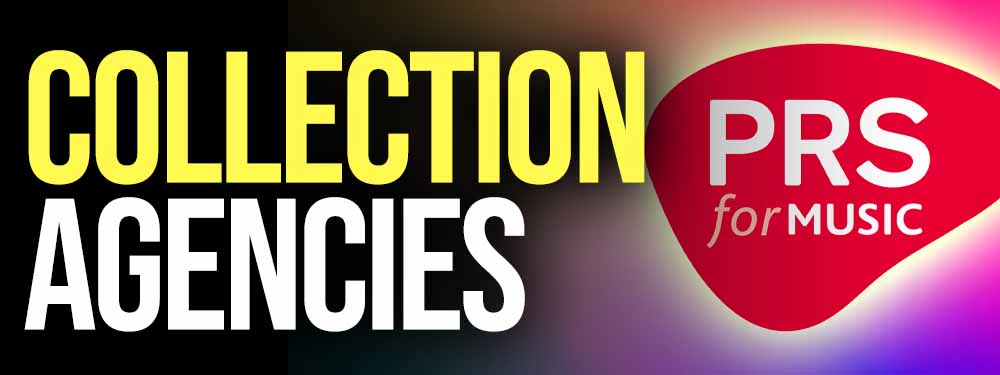
You can only use a specific Collection Society based on your location.
The group makes different deals with collecting groups in other countries or regions (for example: the US compared to the European Collection Society.)
Even if your Apple Music streams collect royalties generated in Canada...
You'll need the Collection Society to fully collect mechanical royalties.
These Collection Society contracts say how royalties from one country or region are paid to songwriters and composers in another country or region.
Scared you're missing out on mechanical royalties?
Make sure you sign up with a collection agency today!
The best part: Collecting societies keep track of how the works are played and shared on radio, TV, in public places, and online.
What Is A White Label Distribution Company?
White-label products (your music) are those that are manufactured and not necessarily marketed by the same company that sells them.
The benefit is that only one business entity is needed to initiate and complete the entire procedure of product development and distribution.
Companies can specialize in different aspects of the product's life cycle, such as production, marketing, or sales, depending on their strengths and preferences. The way
White label branding helps businesses save money and time in the production and promotion phases.
Private label brands have many benefits, including reduced transportation costs and distribution efficiencies if a supermarket signs an exclusive contract with a manufacturer.
The retailer's profit margin increased as a result of selling the product at a lower price thanks to the reduced cost of transporting the item.
Consumers seem to be becoming more price-conscious and less loyal to their tried-and-true brand names, as evidenced by the rise of private-label products.
Private label brands are expanding rapidly, cutting into the market share of national brands (the manufacturers) in many nations.
What Is SonoSuite?
To put it simply, white labeling SonoSuite allows you to use the technology while customizing it to fit your needs and promoting your own brand.
Although standard menus and sections are present, you can create a dashboard that reflects your brand identity down to the colors.
In this way, you can launch your own music distribution platform from the ground up, complete with your own unique branding and customizations, and then start charging other businesses for your services.
You can maximize your own and your clients' digital music earnings with the help of a white label digital music distribution service like SonoSuite, which supports a wide range of business models like pay-as-you-go and revenue sharing.
It enables you to launch a fully-fledged, branded, and customizable music distribution service, as well as to market and sell those services to other businesses.
Our extensive knowledge of the digital supply chain is made available to them through SonoSuite, allowing them to expand catalog management, distribution, marketing, licensing, and royalty accounting.
More than two hundred online music stores are integrated with SonoSuite, meaning that the platform can distribute thousands of new albums every month.
Get your music on playlists now.
It’s time you get your exposure and listeners up - playlisting by Boost Collective has been trusted by 50,000+ artists worldwide.
It’s easy: Search your song, get on playlists, and track your campaign.
What’re you waiting for? Tap in - and get added to playlists in 24 hours.
Join Boost Collective for free here.
